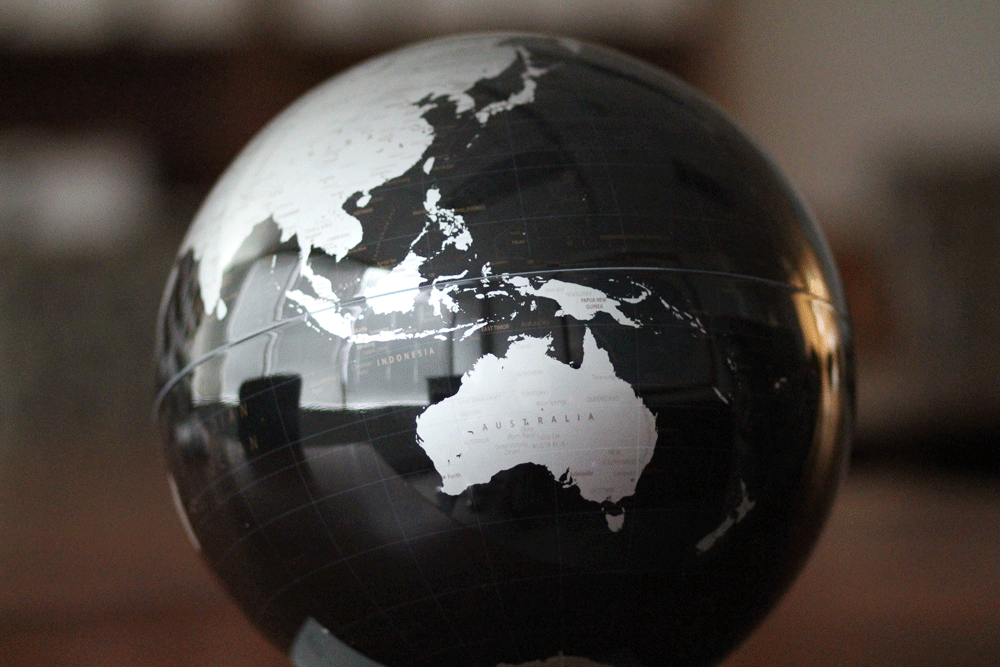Where in the world?
Posted By Levi J. West on November 21, 2012 @ 13:00
During a recent Telstra-ASPI luncheon speech, Robert D. Kaplan took the audience on a tour of the ‘hot spots’ of insecurity around the globe [2]. The crux of Kaplan’s presentation (and his new book The Revenge of Geography [3]) is that in the globalised world of tweets, ‘likes’ and viral video, analysts have forgotten the enduring impact of geography, and the indelible effects it has had (and continues to have) on national and international security.
While this approach is useful to explain the development of the nation-state, with its linkage to geographical and territorial identity, today there is a range of non-state actors and transnational groups, whose motivations and actions aren’t as deterministic, and whose existence and structure are more virtual than linked to any discrete geography. To get a handle on these players, it’s perhaps necessary to broaden the notion of geography.
For example, an understanding of Yemen’s history, the role that its mountainous geography has played in its development (or lack thereof) and the challenges that this presents to the capacity of a central government to maintain any semblance of order would clearly make for a more sophisticated response from Western analysts and policymakers to cooperation with local bodies on the threat posed by al Qaeda on the Arabian Peninsula [4]. Together, a good grasp of the physical and human geographies of the area provide a firm foundation for the investigation of transnational terrorism, why it has emerged from there and its intrinsic characteristics. Indeed, seeking to gain such an understanding without a foundation in these matters seems deeply problematic and perhaps reminiscent of some of the recent failures of counterterrorism policy.
Kaplan discussed the need to recognise the limits on freedom of action that geography can impose. But it’s also useful to consider the limitations and challenges to geography itself. Two contemporary issues challenge much of the underpinning logic of geography—cyber security and climate change. The former presents a challenge by being a domain, or generalised ‘place’ beyond the environs of that which geography has traditionally considered its remit, demanding an abstract or virtual geography. Climate change challenges geography by altering perceptions of geographic passivity and malleability, a notion deeply embedded in humanity’s conception of itself as separate from or superior to nature, while serving to reinforce some of the harshest lessons that geography is capable of teaching us.
Cyber threats challenge geography in fundamental ways. For instance, a cyber attack that steals large data sets from a private multinational corporation [5] raises numerous issues, such as exactly where the data was stolen from. The distributed nature of attacks, often perpetrated through unwitting conduits, further challenges our understanding of ‘where’ these attacks are occurring. Thinking of the cyber domain as a generalised geographic location could help in the formation of policy, allowing for the conceptualisation of a cyber-jurisdiction, or the development of ‘place’ that assists in superseding the transnational or non-geographically located nature of digital threats.
The changing dynamics of the natural environment in response to human activity poses a challenge to the hitherto slowly-changing nature of geography. Where it was once possible to dismiss geographic change as existing on a timeframe beyond sensible analysis, or at least beyond the timeframes of governments or policy makers, it might now become an underlying cause of insecurity or conflict. The possible increased prevalence of extreme weather events also poses a challenge that could benefit immensely from a geographic perspective. Perhaps geography will reassert itself by force rather than by reliance on the possible relevance of geostrategic thought. Geography’s revenge will perhaps be far more violent and complex than a return to assessments of nation-state orientated geographic determinism.
Unfortunately, little attention was paid at the lunch to the application of geography to the analysis of non-traditional security issues. Kaplan’s speech, and much of the contents of his new book, serves as a reminder of the influence of the ideas of Halford Mackinder [6], the ‘godfather of geopolitics’. Nicholas Spykman’s Cold War concept of containment owed debts to Mackinder and to Thomas Mahan. Kaplan’s reminder of the importance of them, and of geography and geopolitics, is welcome.
But we should remember that many nonstate and transnational agenda items remain, and that they are adaptable, flexible, and free of the geographic determinism that a nation-state is susceptible to. As much as many analysts would like international security to remain focused on states, and on the quasi-predictable chess board on which they manoeuvre, the environment is replete with actors that defy the logic of traditional geography and geopolitics. Increasingly, the security community is faced with threats that exist beyond traditional geography. Kaplan’s book and speech reminds us of the immense utility of geography as a discipline, and in the same breath, demonstrates the need for its broader application and possible re-conception—perhaps as ‘geography 2.0’.
Levi J. West is a lecturer in terrorism and national security and course coordinator of the Master of Arts (Terrorism, Safety and Security) at the Australian Graduate School of Policing and Security, Charles Sturt University. Photo by Luke Wilson (ASPI).
Article printed from The Strategist: https://aspistrategist.ru
URL to article: /where-in-the-world/
URLs in this post:
[1] Image: https://aspistrategist.ru/wp-content/uploads/2012/11/Globe_web.gif
[2] Robert D. Kaplan took the audience on a tour of the ‘hot spots’ of insecurity around the globe: http://www.aspistrategist.ru/events/recentEventDetail.aspx?eid=496
[3] The Revenge of Geography: http://online.wsj.com/article/SB10000872396390443686004577633490631541260.html
[4] al Qaeda on the Arabian Peninsula: http://www.pbs.org/wgbh/pages/frontline/al-qaeda-in-yemen/
[5] steals large data sets from a private multinational corporation: http://www.mobiledia.com/news/114378.html
[6] Halford Mackinder: http://www.britannica.com/EBchecked/topic/354948/Sir-Halford-John-Mackinder
Click here to print.
